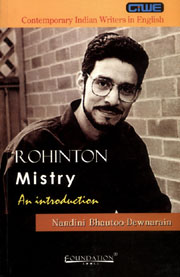Book contents
- Frontmatter
- Contents
- Series Editor's Preface
- 1 Introduction
- 2 The Local and the Universal
- 3 ‘Otherness’ in Mistry
- 4 Politics in Mistry's Fiction
- 5 Recurring Themes
- 6 Rohinton Mistry and Indian Writing in English
- Topics for Discussion
- Appendix A The 1975 Emergency
- Appendix B MISA
- Appendix C The History of the Bangladesh Conflict
- Appendix D List of Honours and Awards
- Bibliography
4 - Politics in Mistry's Fiction
Published online by Cambridge University Press: 05 November 2011
- Frontmatter
- Contents
- Series Editor's Preface
- 1 Introduction
- 2 The Local and the Universal
- 3 ‘Otherness’ in Mistry
- 4 Politics in Mistry's Fiction
- 5 Recurring Themes
- 6 Rohinton Mistry and Indian Writing in English
- Topics for Discussion
- Appendix A The 1975 Emergency
- Appendix B MISA
- Appendix C The History of the Bangladesh Conflict
- Appendix D List of Honours and Awards
- Bibliography
Summary
It is impossible for anyone to read Mistry's fiction and not be aware of the depth to which it is embedded in the political background of post-Independence India. One can even say that his novels constitute rare fictional explorations of important political events that contributed to the shaping of the nation after it attained independence in 1947. However, it is important to stress that although politics influence the direction of the narrative in all three novels, they do not dominate the telling. The author is more concerned with the repercussions of these political conditions on the people.
Politics form an important subtext to the main action of all three novels. This preoccupation moves increasingly closer to contemporary times as Mistry tackles first, in Such a Long Journey, the Bangladeshi war with Pakistan, second, Indira Gandhi's declaration of a State of Emergency which affects the livelihood of the tailors of A Fine Balance and finally, in –Family Matters, the impact Hindu fundamentalist agitation and the post-Babri Masjid riots had on the life of the ordinary Indian.
There are two ways to read politics: first, in the sense of state and national politics and the second, in terms of cultural politics which focus on the role of the individual within the family, the community and the nation. This chapter intends to highlight both the national politics that form the background to Mistry's fiction and his cultural politics.
- Type
- Chapter
- Information
- Rohinton MistryAn Introduction, pp. 64 - 84Publisher: Foundation BooksPrint publication year: 2006

